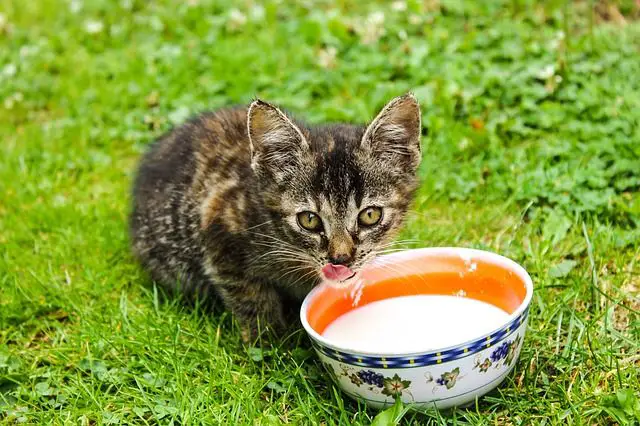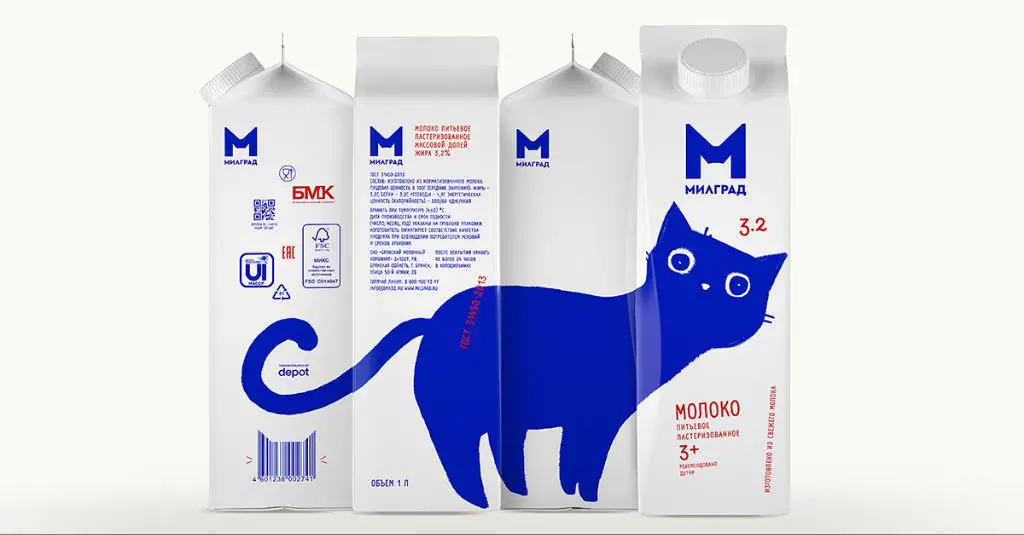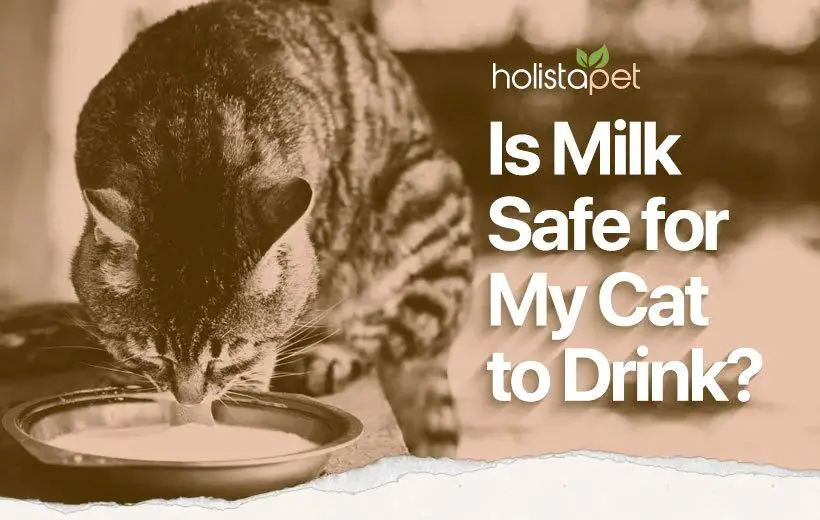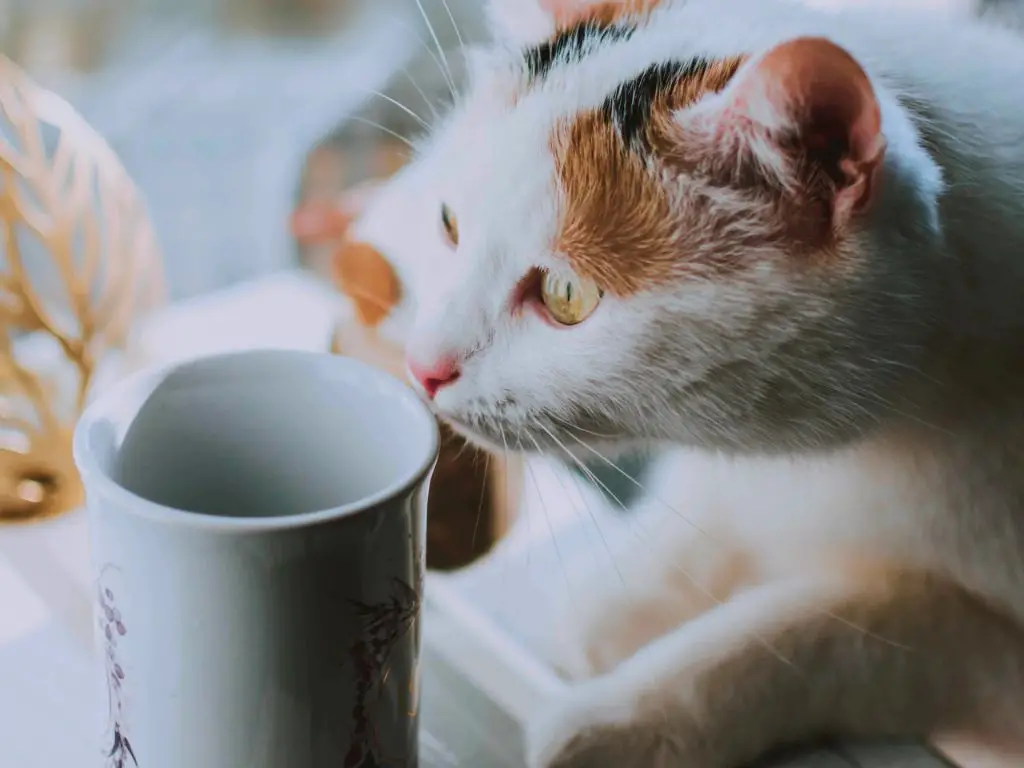What is Lactose?
Lactose is a sugar found in the milk of mammals, including cows, goats, and humans (Merriam-Webster, 2023). It is made up of two simpler sugars – glucose and galactose. When consumed, lactose requires the enzyme lactase to break it down into glucose and galactose, which can then be absorbed into the bloodstream. Lactose intolerance is a condition where people lack sufficient lactase enzymes to properly digest lactose (RxList). This results in gastrointestinal symptoms like abdominal pain, bloating, gas and diarrhea after consuming lactose-containing foods.
Lactose in Cat Milk
Like other mammals, cat milk does contain lactose. According to Chewy (https://be.chewy.com/are-cats-lactose-intolerant/), human milk contains about 6 to 7 percent lactose, while cat milk contains about 4 to 5 percent lactose. Cow’s milk, in comparison, contains a similar amount of lactose as cat milk.
However, kittens are born able to properly digest the lactose in their mother’s milk. Quora (https://www.quora.com/Does-a-mother-cats-milk-contain-lactose-I-read-that-cats-are-lactose-intolerant-so-I-was-curious) notes that kittens have the enzymes needed to break down the lactose in milk as their main energy source. As kittens grow into adult cats, many lose some ability to digest lactose, leading to lactose intolerance.
Kittens and Lactose
Kittens are born able to digest lactose because they need it for proper growth and development. Like human infants, kittens have high levels of the enzyme lactase which allows them to break down the lactose sugar found in their mother’s milk.
However, as kittens mature and are weaned off their mother’s milk, their lactase levels begin to decrease naturally. By the time cats reach adulthood, most have lost about 90% of the lactase they had as kittens.
This means adult cats are lactose intolerant and cannot properly digest dairy products. Consuming milk and other dairy can lead to digestive upset in cats. Signs of lactose intolerance include diarrhea, vomiting, gas, and abdominal pain (Zoetis Pet Care).
Adult Cats and Lactose
Unlike kittens, the majority of adult cats are lactose intolerant and cannot properly digest milk. According to research, over 90% of adult cats lack the lactase enzyme needed to break down lactose in milk (Source). When an adult cat drinks regular cow’s milk, the undigested lactose travels to the colon where it ferments and causes uncomfortable symptoms.
The most common signs of lactose intolerance in adult cats include:
- Diarrhea
- Excessive gas or flatulence
- Abdominal pain and cramping
- Bloating
- Nausea and vomiting

Some cats may also experience constipation or exhibit increased thirst and urination after consuming lactose. The severity of symptoms can vary based on the individual cat and amount of milk consumed. Nonetheless, it’s generally recommended to avoid giving regular cow’s milk to adult cats.
Lactose-Free Cat Milk
For cats with lactose intolerance, there are commercially available cat milk products that are lactose-free. These products remove the lactose from cow’s milk through an enzymatic process that breaks down the lactose into simpler sugars that are easier for cats to digest.
The main benefit of lactose-free cat milk is that it allows lactose intolerant cats to enjoy the taste and nutrition of milk without experiencing digestive upset. Lactose-free milk products are generally safe substitutes for regular milk.
Some popular brands of lactose-free cat milk include:
- Goat’s Milk Esbilac – Available at major pet stores or online
- Lactaid – Can usually be found in grocery stores with the lactose-free milk for humans
- Purina Pro Plan Veterinary Diets NF – Requires a vet prescription

When searching for lactose-free cat milk, always check the label to confirm it is 100% lactose-free. This will ensure your cat can comfortably digest and benefit from the nutrients in the milk.
Alternatives to Milk
Milk is not essential for cats, so there are many healthy alternatives that can provide nutrition without the lactose. The healthiest drink for cats is water. For adult cats, plain water is best to stay hydrated. Kittens, however, may need milk replacers to get adequate nutrition.
For cats that don’t tolerate lactose well, some good milk alternatives include:
- Lactose-free cat milk, like Whiskas Lactose Free Cat Milk
- Bone broth made from animal bones and meat
- Meat purees or baby food with a high meat content
Small amounts of regular dairy like goat milk or cow milk may be tolerated by some cats. But lactose-free and dairy-free options are ideal for cats prone to digestive upset from lactose.

Ultimately water is the healthiest drink for adult cats. Lactose-free milk alternatives can provide an occasional treat, but are not necessary for cats once weaned.
Tips for Cats with Lactose Intolerance
If you suspect your cat may have issues digesting milk and dairy products, it’s important to speak to your veterinarian for personalized advice. They can help diagnose any intolerances and suggest treatment options.
In general, it’s recommended to slowly transition lactose intolerant cats off of milk to avoid any stomach upset. Try mixing small amounts of lactose-free cat milk or non-dairy alternatives with regular milk at first. Gradually decrease the amount of regular milk over a week or two.
You may also ask your vet about using lactase enzyme supplements or probiotics to help your cat better digest lactose. According to one source, “Lactase enzyme supplements like Lactaid can help improve digestion of lactose” (https://wagwalking.com/cat/condition/lactose-intolerance).
With some patience and care, most cats can adjust to a low-lactose or lactose-free diet. Focus on transitioning slowly while monitoring your cat’s symptoms. Your vet can provide tailored guidance to make the process easier on your feline friend.
Signs of Lactose Intolerance
The most common signs of lactose intolerance in cats are gastrointestinal issues like diarrhea, vomiting, flatulence, and abdominal discomfort. Diarrhea is often loose, watery, and foul-smelling when caused by lactose intolerance. Vomiting may happen shortly after consuming milk. Excess gas and belching can also occur (Source).
These signs may develop over time as the cat consumes more lactose. Some cats show symptoms right away after drinking milk, while others take hours or days of continued exposure before issues arise. The severity can also vary between individual cats, ranging from mild to severe intestinal distress (Source). Mild cases may involve loose stools and occasional vomiting, while severe cases lead to prolonged diarrhea, vomiting, dehydration, and weight loss.
Diagnosing Lactose Intolerance
Diagnosing lactose intolerance in cats typically involves a process of elimination through diet trials and food challenges under veterinary supervision. Vets may recommend an elimination diet that removes all dairy products for 2-3 weeks to see if symptoms resolve. Then, dairy can be reintroduced while monitoring for return of any gastrointestinal signs or discomfort. This helps confirm whether dairy is the culprit.
Specialized tests like breath hydrogen tests can also assist in diagnosis. These tests measure hydrogen levels in the breath after consuming lactose. Elevated hydrogen indicates improper digestion and absorption of lactose. However, these tests are not commonly performed in veterinary medicine.
Since many conditions can cause similar symptoms, it is important to have veterinary guidance. Cats should be evaluated for other possible gastrointestinal issues before concluding lactose intolerance. Careful monitoring of the response to dietary changes can help vets definitively diagnose lactose intolerance.
Cite URL: https://21cats.org/can-cats-be-lactose-intolerant/
The Bottom Line
In summary, cat milk does contain lactose just like cow’s milk. While kittens are able to digest lactose in their mother’s milk, the majority of adult cats are lactose intolerant. Lactose intolerance occurs because adult cats lack sufficient lactase, the enzyme that breaks down lactose in the digestive system. When lactose is not properly digested, it can cause gastrointestinal upset like diarrhea, vomiting, and gas.
Some key points to remember:
- Lactose is a sugar found in milk
- Mother’s milk provides necessary nutrients for nursing kittens
- Up to 90% of adult cats are lactose intolerant due to low lactase levels
- Consuming milk can cause digestive issues in lactose intolerant cats
- Lactose-free cat milk, goat milk, or cat milk replacers are safer alternatives
- Avoid giving regular cow’s milk to adult cats

In conclusion, while kittens need milk from their mother for a healthy start, cow’s milk containing lactose is generally not recommended for adult cats. Being aware of signs of lactose intolerance and providing lactose-free options is key for cat owners.
